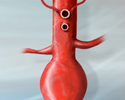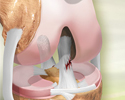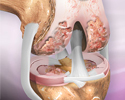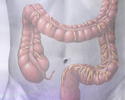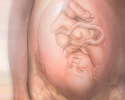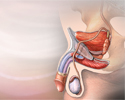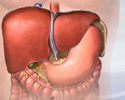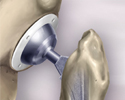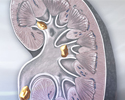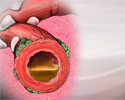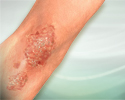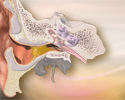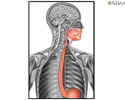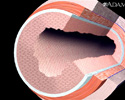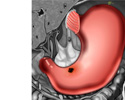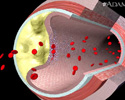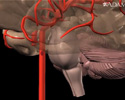Ear infection - chronic
Does your child have pain or discomfort in his ear? Does your child often have a fever and is fussy a lot? If so, they may have chronic ear infections. Ear infections are one of the most common reasons parents take their children to the doctor. The Eustachian tube runs from the middle of each ear to the back of the throat. This tube drains fluid normally made in the middle ear. If the tube gets blocked, fluid can build up, leading to infection. Ear infections are common in infants and children because the Eustachian tubes become easily clogged. If the ears get infected a lot or individual ear infections don't clear up, your child has chronic ear infections. How do you know for sure that your child has a chronic ear infection? Your child will feel like there's pressure or fullness in his ear. He may pain or discomfort in his ear a lot and have a low-grade fever. An infant may be fussy a lot. You may see a pus-like drainage from an ear, and your child may have trouble hearing. Your child's doctor will check for redness, air bubbles, and thick fluid in your child's middle ear. A swab of your child's ear may reveal bacteria that are harder to treat than bacteria that commonly cause an ear infection. The doctor may see a hole in your child's eardrum. To treat a chronic ear infection, your child will probably need to take antibiotics if the infection is due to bacteria, maybe for a long time. If there is a hole in the eardrum, your child may need to use antibiotic ear drops or a mixture of vinegar and water. If the infection does NOT go away, the child may need surgery, to clean the infection out of the mastoid bone in the middle ear, to repair or replace the small bones in the middle ear, or to repair the eardrum. The doctor may also recommend ear tube surgery. In this procedure, a tiny tube is inserted into the eardrum to drain the fluid. The tube will usually fall out on its own. Chronic ear infections are treatable, but your child may need to keep taking medicine even for several months. These infections can be uncomfortable, and they may result in hearing loss or other serious problems.
Ear infection - chronic
Review Date: 1/24/2023
Reviewed By: Neil K. Kaneshiro, MD, MHA, Clinical Professor of Pediatrics, University of Washington School of Medicine, Seattle, WA. Also reviewed by David C. Dugdale, MD, Medical Director, Brenda Conaway, Editorial Director, and the A.D.A.M. Editorial team.
Videos
Browse All
- Abdominal aortic aneurysm
- Abdominal pain
- ACL injury
- Acne
- Adenoid removal
- Adolescent depression
- After your child's ear tube su...
- After your child's inguinal he...
- After your child's tonsil or a...
- After your child's umbilical h...
- Alcoholic liver disease
- Allergic rhinitis
- Allergies
- Allergy testing
- Allergy to mold - animal dande...
- Alzheimer disease
- Anemia
- Ankylosing spondylitis
- Anterior shoulder stretch
- Anti-reflux surgery
- Appendectomy
- Appendicitis
- Arm reach
- Arthritis
- Asperger syndrome
- Asthma
- Asthma - children
- Atopic dermatitis
- Atrial fibrillation
- Attention deficit hyperactivit...
- Autism spectrum disorders
- Basal cell carcinoma
- Before a child's tonsil or ade...
- Bipolar disorder
- Breast cancer
- Breast engorgement
- Breast self-exam
- Breastfeeding
- Bronchitis
- Bronchoscopy
- Cardiac catheterization
- Carpal tunnel syndrome
- Cataracts
- Cerebral palsy
- Cervical cancer
- Chest pain
- Childhood obesity
- Cholesterol and triglyceride t...
- Chronic obstructive pulmonary ...
- Cluster headache
- Cold treatments for kids
- Colon cancer
- Colon cancer screening
- Colorectal polyps
- Common cold
- Concussion
- Crohn disease
- C-section
- Cystic fibrosis
- Cystic fibrosis - nutritional ...
- Depression
- Diabetes
- Dialysis
- Diarrhea
- Ear infection - acute
- Ear infection - chronic
- Ear tube insertion
- Earache
- Electrocardiogram
- Endometriosis
- Enlarged adenoids
- Enlarged prostate
- Epilepsy
- Erection problems
- Essential hypertension
- External rotation with band
- Fibromyalgia
- Flu
- Food poisoning
- Foot pain
- Gallstones
- Gastroesophageal reflux diseas...
- Gastroesophageal reflux in inf...
- Getting rid of lice in the hom...
- Glaucoma
- Hardening of arteries
- HbA1c
- Head injury
- Head lice
- Healthy Guide to Fast Food
- Hearing loss
- Heart attack
- Heart failure
- Heel pain
- Hepatitis A
- Hepatitis B
- Hepatitis C
- Hernia
- Herniated disk
- Hip joint replacement
- Hodgkin lymphoma
- How do ear tubes come out?
- How to remove a splinter
- How to stop bedwetting
- How to treat a nosebleed
- How to treat a sunburn
- How to use a peak flow meter
- How to use a pill cutter
- How to use eye drops
- How to use nasal sprays
- Hypertension
- Hyperthyroidism
- Hypothyroidism
- Hysterectomy
- Infant formulas
- Inguinal hernia repair
- Inhaler with no spacer - adult...
- Inhaler with no spacer - child...
- Inhaler with spacer - adults
- Inhaler with spacer - child
- Insomnia
- Internal rotation with band
- Iron deficiency anemia
- Irritable bowel syndrome
- Isometric
- Kidney stones
- Knee joint replacement
- Let's talk about pink eye
- Lung cancer
- Lyme disease
- Melanoma
- Menopause
- Migraine
- Multiple sclerosis
- Nasal congestion
- Neck pain
- Newborn jaundice
- NICU consultants and support s...
- Nuclear stress test
- Obstructive sleep apnea
- Osteoarthritis
- Osteoporosis
- Pap smear
- Pendulum exercise
- Peptic ulcer
- Pharyngitis
- Plantar fasciitis
- Pneumonia
- Pregnancy care
- Prepare for your child's ear t...
- Prepare for your child's herni...
- Prostate cancer
- Psoriasis
- Rheumatoid arthritis
- Rotator cuff problems
- Sciatica
- Scoliosis
- Seizures
- Shingles
- Shoulder blade retraction
- Shoulder blade retraction with...
- Shoulder pain
- Sinusitis
- Sleep disorders
- Smoking tips to quit
- Spinal stenosis
- Stent
- Storing breast milk
- Strep throat
- Stretching back of your should...
- Stroke
- Systemic lupus erythematosus
- Tension headache
- The difference between a cold ...
- Tips on buying cold and flu me...
- Tips on removing ear wax
- Tonsillectomy
- Tonsillitis
- Tracking your blood pressure a...
- Treating congestion in babies...
- Treating eyelid bumps
- Type 1 diabetes
- Type 2 diabetes
- Ulcerative colitis
- Understanding cholesterol resu...
- Up the back stretch
- Urinary incontinence
- Uterine fibroids
- Vacation health care
- Varicose veins
- Venous insufficiency
- Wall push-up
- Wall stretch
- Warts
- What are hives?
- What are night terrors?
- What causes wheezing?
- What in the world is a neti po...
- What is tennis elbow?
- What makes your heart beat?
- What to do when kids put thing...
- What to do when kids put thing...
- What to do when something gets...
Animations
Browse All
- Allergies
- Alzheimer disease
- Ankle ligament injury
- Arrhythmias
- Atherosclerosis
- Athetosis resulting from basal...
- Balloon angioplasty - short se...
- Bladder function - neurologica...
- Blinking
- Blood clotting
- Blood flow
- Blood pressure
- Bone fracture repair
- Brain components
- Breast lift
- Breathing
- Bunion
- Cancer of the throat or larynx...
- Cardiac conduction system
- Cardiomyopathy
- Cardiovascular system
- Cataract
- Cell division
- Cerebral aneurysm
- Cesarean section
- Components of skin
- Conception - general
- Conception - pregnancy
- Conception of identical twins...
- Concussion
- Corneal injury
- Coronary artery bypass graft (...
- Coronary artery disease
- Cosmetic surgery of the face
- Coughing
- Diabetes - retinal conditions...
- Digestion
- Directional coronary atherecto...
- Early labor
- Egg cell production
- Egg production
- Endocrine glands
- Enlarged prostate gland
- Epinephrine and exercise
- Exercise
- Feeling pain
- Fetal ear development
- Formation of twins
- Gas exchange
- Glaucoma
- Gout
- Hearing
- Hearing and the cochlea
- Heart bypass surgery
- Heart formation
- Heartbeat
- Heartburn
- Herniated nucleus pulposus (sl...
- Homeostasis
- Human face formation
- Hypertension - overview
- Immune response
- Kidney stones
- Kids - How big is the baby?
- Kids - How does the baby come ...
- Kids - Is it a girl or boy?
- Kids - Umbilical cord
- Kids - Where do babies come fr...
- Liposuction
- Lymph nodes
- Lymphatics and the breast
- Macular degeneration
- Muscle types
- Nerve conduction
- Nervous system formation
- Nutrient exchange
- Osteoarthritis
- Osteoporosis
- Ovulation
- Parkinson disease
- Percutaneous transluminal coro...
- Peristalsis
- Phagocytosis
- Pituitary gland
- Placenta delivery
- Placenta formation
- Preeclampsia
- Pregnancy
- Red blood cell production
- Reflex response
- Retina
- Retinal detachment
- Rupturing membranes
- Seeing
- Sexual differentiation
- Shoulder joint dislocation
- Skeletal formation
- Skeletal muscle
- Skeletal system components
- Skin conditions
- Smelling
- Smoking
- Snoring
- Sperm production
- Sperm release pathway
- Stomach ulcer
- Stomach ulcer
- Stroke
- Stroke - secondary to cardioge...
- Sun's effect on skin
- Swallowing
- Sweating
- Tachycardia
- Tasting
- The role of amniotic fluid
- Tobacco use - effects on arter...
- Twin-to-twin transfusion syndr...
- Ultrasound
- Urination
- Vaccines
- Vaginal delivery

